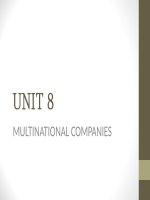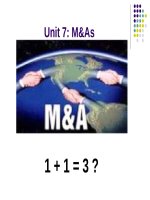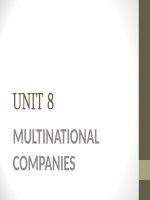TIẾNG ANH KINH tế mỗi NGÀY TELEPHONING AND WRITING
Bạn đang xem bản rút gọn của tài liệu. Xem và tải ngay bản đầy đủ của tài liệu tại đây (862.02 KB, 16 trang )
47
A
Telephoning 1: phones and numbers
Telephones and beyond
landline – a ‘traditional’ phone plugged into the wall
public telephone / payphone – a phone in a public place operated with coins or a phone card
mobile phone (BrE) / cellphone (AmE) – a phone you can carry with you. Callers can leave a
voice message on voicemail, or send you a written text message or text.
smartphone – a mobile phone that can be used as a small computer and that connects to
the internet
With 3G mobile phone networks you can use your smartphone to connect to the internet and
with a 4G signal the internet connection is faster.
extension – one of a number of phones on the same line, in a home or office
cordless phone or cordless – a phone extension not attached by a wire that you can use
when you are walking around the house, outside in the garden, etc.
VoIP (voice over internet protocol) – uses the internet for phone calls, such as on Skype, so
you don’t pay the normal phone charges
webcam and microphone – a camera attached to a computer so that two people connected over
the internet can see each other and talk to each other using the microphone
videoconferencing allows several people in one place to see people in another location and
hold a meeting together. This is normally used to refer to companies who have their own
systems, but videoconferencing can now also be done with participants each using their
individual webcam over the internet.
B
‘Phone’, ‘call’ and ‘ring’
Note
call
someone
to phone
telephone
to give someone a call
C
In BrE you can say:
ring
to
someone
ring up
to
ring
someone up
In AmE you can say:
In BrE, you can also say:
to
give
someone a ring
In informal BrE, you can also say:
to
give
someone a bell
a buzz
Numbers
to
call up someone
to
call
someone
up
When saying numbers, use rising intonation for each group, except for the last group, when you
should use a falling tone. This shows you have reached the end of the number.
D
country code
area code
number
00
44
1746
845
921
Double oh (BrE)
double four
one seven four six
eight four five
nine two one
Zero zero (AmE)
four four
Doing things over the phone
helpline/information line – you can
find out about a company’s products
or services
hotline – often used by companies as
a more exciting alternative to ‘helpline’
booking/reservations line – make
bookings for events, travel and hotels
102
Business Vocabulary in Use Intermediate
Note
Phone numbers for particular purposes include:
People who answer and deal with calls like these
work in call centres (BrE); call centers (AmE).
BrE/AmE: reservations; BrE only: booking
A number that you can call free of charge is:
an 0800 number or a freephone number (BrE);
a 1–800 number or a toll-free number (AmE).
Exercises
47.1
Which type of phone or service in A opposite
would each of these people use?
1 Two people in different countries who
want to talk without paying for an
international call.
2 Five company managers in different
countries who want to talk and see each
other using a special system set up by
their company.
3 A building contractor who works in lots
of different places.
4 Someone who wants to stay in touch
when they’re in their garden.
5 A teenager who has gone out without
her mobile and wants to tell her parents where she is. (2 expressions)
6 A manager who phones a colleague and finds that their mobile is switched off. (2 expressions)
7 Two ordinary people – not company managers – each sitting in their own bedroom in their
respective homes, without access to a special system, who use the internet to see and talk to
each other.
47.2
Look at B opposite and decide which of these items are grammatical. Correct the ungrammatical ones.
1
2
3
4
5
6
7
8
47.3
It would be good to see Anna soon. I’ll phone to her and see when she’s free.
I gave Brian a call yesterday and we had a long chat.
Why you don’t ring to Pizza Palace and order some takeaway pizza?
I rang them five minutes ago but there was no answer.
Call up me next time you’re in New York.
Give me a ring when you’re next in London.
I’ll give the bell to her and we’ll go out for a meal.
When you get some news, make me a call.
Look at C opposite. You phone the Cross-Channel Ferry Company and you hear this:
‘Welcome to the Cross-Channel Ferry Company’s freephone hotline. If you’d like to
receive a brochure, press 1. For today’s sailing times and weather conditions, press 2. If
you’d like to make a reservation, press 3. If you’d like to change an existing reservation,
press 4. If you want to book a package holiday, press 5. If you want to hear this list
again, press 6.’
Which number do you press in these situations?
a
b
c
d
e
You have a reservation on the 15.00 ferry and you want to take the 18.00 instead.
You want to book a return trip.
You are confused about the different choices.
You often get seasick and want to check how rough the sea will be today.
You want a ferry crossing and an organized trip to the Loire Chateaux.
Over to you
• D
o you like using call centres, or do you prefer to look for information, make bookings, etc. on
the internet?
• W
hen was the last time you called an organization? What happened? Were you happy with the
way the call was dealt with?
Business Vocabulary in Use Intermediate
103
48
A
Telephoning 2: trying to get through
Asking to speak to someone
Mike Barr wants to speak to Jane Owen.
Primo Plastics, good morning.
Hello. Can you put me through to Jane Owen in
Sales, please?1
One moment, please.2 I’m afraid the line’s busy. Do
you want to hold or would you like to call back later?
I’ll call again later. What’s her direct line?3
Her direct line is 7942 8321.
7942 8321. Thanks. Goodbye.
You can also say:
Extension 123, please.
I’m putting you through.
3
I’ll try again later. Could you give me the number for her direct line?
1
2
B
Voicemail 1
Later, Mike Barr calls again, and this time he gets through to Jane’s voicemail. This is her greeting:
‘You’re through to the voicemail of Jane Owen. I’m away at a conference until Monday the
5th, but I’ll be picking up my voicemail on my mobile. If you leave a message, I’ll get back
to you. For anything urgent, please call my PA, Ros Brown, on extension 8325.’
‘Please leave a message after the tone.’
After leaving a message, you may hear this:
‘To listen to your message, press 1.’
After listening to your message, you will probably hear this:
‘If you’d like to change your message, press 2. If you’d like to delete your message, press
4. Otherwise, please hang up.’
C
Voicemail 2
Mike leaves this message:
‘Hello, this is Mike Barr from Smartauto. It’s about our order for specialized plastic
components. There have been some last-minute changes in the specifications. I hope your
manufacturing people haven’t started making them yet! Would it be possible to call me back
at my office on 0117 893 4522? Otherwise, you could call me on my mobile on 07974 522 742
during the weekend, or first thing on Monday. It’s very urgent. Bye for now.’
104
Business Vocabulary in Use Intermediate
Exercises
48.1
Arabella Ford is trying to phone John Quinn in Primo’s finance department. Complete the gaps with
expressions from A opposite. Be careful to use the alternative expressions where necessary.
Receptionist: Primo Plastics, good morning.
Arabella:
Hello. Can (1)
Finance, please?
Receptionist: (2)
Arabella:
I’ll (7)
to John Quinn in
, please. I’m (3)
. … I’m afraid (4)
. Do you (5)
or would you like to (6)
?
,
.
(One minute later.)
Receptionist: The line’s still (8)
Arabella:
I’ll try (9)
(10)
Receptionist: His (11)
Arabella:
7942 …
Receptionist: … 8339.
Arabella:
8339. Thanks. Goodbye.
Receptionist: Goodbye.
48.2
, I’m afraid.
. Could you give me
his direct line?
is 7942 …
Write voicemail greetings for other Primo employees, based on this information, using expressions from
B opposite.
1 Steve Fox – on holiday until Mon 12th – will not be picking up messages – will respond when he
gets back – anything urgent, contact colleague Rob Timmins – extension 8359. If you have
message – leave it after tone.
2 Sue Leighton – away on business trip until Thursday – will pick up messages – leave a message
after the tone – get back to you as soon as possible.
3 Rod Baxter – on training course until 20 Jan. Not picking up voicemail – can leave message and
will respond when he gets back. Urgent queries – PA Jill Salford – direct line 8466.
4 Tina Preston – in meetings all day today, Friday. Leave a message – will get back Monday morning.
Urgent matters – colleague Keith Samson – extension 8521.
48.3
Another caller leaves a message on Jane Owen’s voicemail. Complete the message using the correct
words from C opposite.
Jenny Robin (2)
Quirky Furniture Ltd. It’s very
‘Hello, this (1)
urgent. Would it be possible (3)
call me back (4)
my office
(5)
020 8945 8333 first thing on Tuesday? Otherwise, you could call me this
afternoon (6)
my mobile (7)
07962 290 821. It’s about our order
for plastic furniture components. We still haven’t received them! Bye for now.’
Over to you
• What are some of the difficulties in using the phone in English?
• W
rite a voicemail greeting in English for yourself of a kind you use when not at your office.
• Do you leave messages on people’s voicemail? Or do you prefer email?
Business Vocabulary in Use Intermediate
105
49
A
Telephoning 3: getting through
Getting through
Mike phones again and gets through to Jane Owen’s PA – her
personal assistant.
Jane Owen’s office, good morning.
MB:
Hello. Can I speak to Jane Owen, please? Is she
available?
PA:
I’m afraid Ms Owen’s not available – she’s with a
customer right now.
MB:
Oh, right. Can I leave a message for her, please?
PA:
Who’s calling, please?
MB:
It’s Mike Barr here, from Smartauto Cars.
Giving and taking messages
The personal assistant can also say:
Can/May I take a message?
Would you like to leave a message?
I wonder if you could call back later?
Can I ask who’s calling?
Could you give me your name?
Which company are you calling from?
Can/May I ask what it’s about?
I’ll ask her to call you (when she gets back
/ when she’s free).
I’ll give her your message.
C
The caller could say:
Could I leave a message?
Could you tell her that … ?
I’m calling about …
I want / I’d like to talk about …
I’m calling to confirm that …
Could you ask her to call me back?
My number’s …
Note
B
PA:
When you answer the phone,
you do not say ‘I am X.’
Spelling names
If you want to spell a name, you can say, for example, ‘A for Alpha, B for Bravo’, etc.
Alpha
Hotel
Oscar
Victor
Bravo
India
Papa
Whiskey
Charlie
Juliet
Quebec
X-ray
Delta
Kilo
Romeo
Yankee
Echo
Lima
Sierra
Zulu
Foxtrot
Mike
Tango
Golf
November
Uniform
You may also need these expressions:
capital A
slash (/)
small a
dot (.)
all one word
at @
new word/line
colon (:)
dash (–) or hyphen (-)
com (as in internet addresses)
Spell email addresses like this: = jane hyphen smith at a–o–l dot com.
D
Taking messages: checking information
a
b
c
d
e
f
g
h
106
I’m sorry, I didn’t catch your name. Could you spell it, please?
Is that with a D at the end – D for David?
Did you say your number is 624 426?
Is that with B for Bravo or V for Victor?
Where did you say you’re calling from?
Is that with one M in the middle or two?
The code for Sweden is 49, right?
Is that Milan like the city?
Business Vocabulary in Use Intermediate
Exercises
49.1
Look at A and B opposite. Change the underlined expressions in these conversations so that they are
correct and more polite.
1 A:
B:
A:
B:
A:
B:
49.2
I want to speak to Ms Sangster.
She’s busy.
I’m Sven Nyman talking.
Why are you calling?
I want to discuss her order.
I’ll tell her to call you when she’s free.
2 A: Hello. Is Jack Bronson able to speak
on the phone?
B: No. Who are you? What company
do you work for?
A: Rosario Gonzalez. Excelsior Media Services.
Take a message for him. Tell him that I’ve
received his cheque.
B: He will get the message.
Spell the following as you would spell them on the phone. Use the table in C opposite to help you.
The first one has been done as an example.
1 Maeght: M for Mike, A for Alpha, E for Echo, G for Golf, H for Hotel, T for Tango.
5
2
PETER HOUSE
Valladolid
6
3
Macpherson
WEBER
4
7
T O :
S U B J E C T:
49.3
Match the responses (1–8) with the questions (a–h) in D opposite.
1
2
3
4
5
6
7
8
No, actually it’s 46.
It’s Valladolid with a V at the beginning, V for Victor.
No, it’s Schmidt with a T at the end, T for Tango.
Two. T–I–double M–E–R–M–A–N.
No, 642 246.
Springer Verlag in Hamburg.
Krieslovski. K–R–I–E–S–L–O–V–S–K–I.
No, it’s with two Ls in the middle and a D at the end.
Over to you
• Practise spelling words you have to give on the phone using the alphabet in C opposite.
• Practise giving your own email address and the address of your company’s website.
Business Vocabulary in Use Intermediate
107
50
A
Telephoning 4: arrangements
and ending calls
Phoning again
Mike phones again and gets through to Jane Owen.
MB:
JO:
MB:
JO:
MB:
B
Hello. Can I speak to Jane Owen, please?
Speaking.
It’s Mike Barr here. I tried to phone you last week.
It’s about our order.
Right. I got your message. I was about to call you.
Yes, we need to talk more about the technical
specifications for the plastic.
Making arrangements
You get through to the person you want to speak to and fix a meeting.
C
Can we fix a meeting?
Shall we arrange an appointment?
Would it be useful to meet up soon?
I’ll (just) get/check my diary.
How about tomorrow?
What about Tuesday?
Would Wednesday be suitable?
Would Thursday suit you?
Shall we say Friday?
That’s fine.
I can’t / won’t be able to make Thursday.
Closing the conversation
Here are some ways of finishing a conversation without sounding rude.
See you on Friday then.
Yes, I’ll look forward to seeing you then.
I’m going to have to go now.
I’ve got to go to a meeting.
I have to go and see someone.
D
Nice talking to you.
(It’s been) good talking to you.
Good to talk to you.
Nice talking to you.
Talk to you soon, no doubt.
Thanks for phoning.
We’ll be (back) in touch soon.
Look forward to hearing from you soon.
Thanks for calling.
Changing arrangements
Jane Owen and Mike Barr are continuing their conversation.
a JO:
b MB:
c JO:
d MB:
e JO:
MB:
108
I can’t make Tuesday. Something has come up. I’ve got to go over to Berlin to see a client. How
about Wednesday morning?
I can’t make Wednesday morning, I’m afraid. Can you make the afternoon instead?
I think that’s OK. Just let me check my diary … I’m afraid that’s not going to be possible.
I’d completely forgotten we have a departmental meeting that day. Can we put it off till the
22nd?
I’m afraid the 22nd won’t be possible. I’m going to be very busy that day. Could we put it
back until the following week?
I’m completely snowed under the following week. Can we leave it open? I’ll get back in
touch when I’m less busy.
Yes, but we need to make a decision soon!
Business Vocabulary in Use Intermediate
Exercises
50.1
Annelise Schmidt (AS) phones James Cassidy (JC) and arranges to meet him. Reorder their conversation,
which contains expressions from A and B opposite.
a AS: Fine thanks. I’m going to be in London on Tuesday and Wednesday next week. How about
meeting up to discuss how Penguin and Sprenger might work together?
b AS: Hello. This is Annelise Schmidt. You remember we met at the Frankfurt Book Fair last month?
c AS: Look forward to seeing you then. Bye.
d AS: Sounds good. Shall I meet you at your office? I’ve got the address.
e AS: Yes, that’s fine.
f JC: James Cassidy speaking.
g JC: Goodbye.
h JC: I’ll just check my diary. I won’t be able to make Tuesday. I’ve got to go to Manchester. Would
Wednesday suit you? How about lunch?
i JC: OK. See you on Wednesday at 12.30, then.
j JC: Yes, how are you?
k JC: Yes. Why don’t you come round here at about 12.30? Ask for me at reception and I’ll come
down.
50.2
Look at B and C opposite. Which of these exchanges are natural, and which are illogical?
1 A: Nice talking to you. See you on Wednesday.
B: See you Wednesday. Thanks for calling. Bye.
2 A: I’ll look forward to seeing you tomorrow, then.
B: Talk to you soon, no doubt. Bye.
3 A: It’s been good talking to you. I’m going to have to go. I’ve got to go to a meeting.
B: Nice talking to you. I’ll be in touch soon.
4 A: See you this afternoon at 4, then.
B: Yes, we’ll be back in touch soon.
5 A: I’ve got to get on with some work. I’m going to have to go.
B: Talk to you soon, no doubt. Bye.
50.3
Match these possible replies (1–5) with what the speakers say in D opposite.
1 I suppose so: it would have been good to meet. Look forward
to hearing from you when you’re less busy.
2 The 22nd … I’m going to be on holiday. What about the 29th?
3 The afternoon would be no problem. How about at 3?
4 Wednesday’s going to be difficult. Can you make the next day?
5 Yes, the same day the following week would be fine.
Over to you
• Do you make arrangements on the phone at work – or do you prefer to use email?
• Do you find it difficult to end phone calls in English and also in your own language?
Business Vocabulary in Use Intermediate
109
51
Business communication 1: staying in touch
A
Business cards 1
Business cards are an important source of information about your business contacts – people you
meet doing business. Business cards may help you understand the hierarchy (see Unit 45) of the
company you are dealing with. In some places, especially in Asia, it’s important to follow the
etiquette – rules – for their use. In Asia, when someone hands over their card, take it with both
hands, look at it carefully and treat it with care and respect. Do not write or make notes on it. Store it
carefully. Hand over your card in return, ensuring that you always have a supply with you.
B
Business cards 2
norgequip
Sinophone
Gunilla1 R.2 Madsen3 MSc5 CIM6*
Network equipment sales director4
Norgequip
Kirekeveien 505
NO–0317 Oslo, Norway
Tel. +47 29 89 03 10
Fax +47 29 89 03 70
Email:
Wu3 Lee1 PhD5
Technical director4
Sinophone
2049 Ningqiao Rd, 201206 Shanghai
Tel. + 86 21 4101 9020 Fax + 86 21 4101 9025
*Chartered Institute of Marketing
1
first name
middle initial – some people use an initial to show the first
letter of their middle name
3
family name, surname – in the Western world, the family
name comes last (in China and some other places it comes first)
4
job title – the official name of someone’s job
2
C
5
qualifications – some people show their academic
qualifications
6
membership of professional organizations
7
contact details – phone numbers, email address, postal
address, etc.
Staying in touch
Gunilla Madsen is speaking to Wu Lee.
GM:
WL:
GM:
WL:
GM:
WL:
GM:
WL:
GM:
WL:
GM:
WL:
110
Thanks for your card. Wu is your family name, right?
Yes, but please call me Lee.
OK. Yes, I think you’ll be very interested in our latest equipment – the technical specifications
have only just been finalized.
Could you email the specs to me when you get back, Gunilla? My email address is on my
card.
Sure. I’ll attach the specs to the email. It’s going to be quite a large attachment! There are
about ten pages of specs. And I’ll send some brochures by courier – we use DHL.
No problem.
Please get back to me if you have any questions, of course. Email is probably easiest.
Especially with the time difference between Shanghai and Oslo!
Yes, but don’t hesitate to give me a call if you’d like to discuss anything. People don’t use
the phone enough these days!
No, they don’t. So, we’ll be in touch soon … by email or by phone.
Absolutely, it was very nice meeting you, Lee.
Likewise!
Business Vocabulary in Use Intermediate
Exercises
51.1
George was representing his company, Primo Plastics, on their stand at a trade fair in Tokyo. Look at A
opposite and identify five mistakes that he made in relation to card etiquette.
A Japanese businessman, Bunzo Watanabe, came to the stand and said that Primo Plastics was the
sort of special plastics company that his company might like to work with. He handed over his card,
and George took it with one hand. He wrote ‘Tokyo trade fair’ on the back to remind him where he
had met Mr Watanabe. He did not read the card carefully, but put it casually in his pocket. When Mr
Watanabe asked for George’s card, George said, ‘Sorry, but I’ve run out. I’ll write my details on a
sheet of paper.’
51.2
Look at B opposite. Then identify the items below (1–7) on each card. Write the numbers next to the
items.
via Lamborghini, 21
Wolfgang H. Schmidt MBA
Future textiles
Technology consultant
33 Hauptbahnhofstrasse
60433 Frankfurt, Germany
Tel +49 69 453 2100
Email: wolfgang.schmidt@
futuretextiles.de
20154 Milano, Italy
Tel +39 81 532 7000
Email:
Francesca Rossi PhD, IPM*
Textiles Purchasing Manager
Moda C21
Future textiles
*Institute of Purchasing Managers
1
2
3
4
51.3
first name
middle initial
family name / surname
job title
5 qualifications
6 membership of professional organizations
7 contact details, including email address
Complete the conversation between the people in 51.2 using expressions from C opposite.
WS:
FR:
WS:
FR:
WS:
FR:
WS:
FR:
WS:
FR:
WS:
FR:
OK. Yes, I think you’ll be very interested in the latest technical developments – we can offer
consultancy services that will help you choose the right textile supplier.
Could you email me something when you get back, Wolfgang? My (1)
is on my card.
Of course, but it’s going to be quite a large (2)
! Our electronic ‘brochure’ is
about 15 pages long.
No problem.
Please don’t hesitate to (3)
if you
have any questions, of course. Email is probably easiest …
Even if there’s no time difference between Frankfurt and Milan!
Yes, please feel free (4)
. It’s sometimes easier to talk over the phone rather than by email.
Yes, you’re right.
And I can always send textile samples (5)
: we use FedEx.
Good. In our business it’s always good to be able to see and touch the fabric.
Absolutely. Well, it was very nice meeting you, Francesca.
Likewise! We’ll be in touch soon, no doubt.
Over to you
You meet someone at a conference and promise to send them more information about your school
or organization. Write an email to them.
Business Vocabulary in Use Intermediate
111
52
A
Business communication 2: email
Most email programs on computers have icons with abbreviations like these:
inbox contains email waiting for you
to read
subject – what the email is about
cc – copy this email to …
bcc – blind copy this email to … (so that the
other people you’re sending the email to
don’t know you’re sending this copy)
fwd allows you to forward an email – to
send an email you have received to
someone else
delete allows you to get rid of an email
you don’t want to keep
reply to all allows you to send the answer
to the person who sent the email, plus all
those who received copies of it
attach allows you to send an attachment –
a document that you attach to and send
with an email
contact information can be inserted
automatically at the end of an email with
your contact details – name, phone
number, etc.
the address book allows you to store
the email addresses of people that you
write to
reply allows you to send an answer back
to the person who sent the email
B
Email expressions
Reply
From:
To:
Cc:
Date:
Forward
22 June
Dear Lee,
It was very nice meeting you at the trade fair last week. I hope you had a smooth trip back to
Shanghai. Please find attached a Word document with the specs that I mentioned. Georg Berling
is our technical development director for networks: I’m copying him in on this. I will also forward
your details to Anders Petersson, our CEO, as he always follows client relations closely. I hope
you find the specs interesting. Please don’t hesitate to contact me if you require any further
information.
Best wishes,
Gunilla
C
Beginnings and endings
It’s important to use the right degree of formality – seriousness – and deference (see Unit 45).
The following beginnings range from formal to informal: Dear Sir/Madam (used when you don’t
know the person’s name), Dear Ms Caxton, Dear Zoe and Hi Zoe.
The following endings range from formal to informal and are used mainly in emails and faxes: Best
regards, Regards, Best wishes, All the best, Best. Yours faithfully (BrE only) is used in letters and
faxes when you don’t know the person’s name, Yours sincerely (AmE Sincerely) is less formal and
Yours is the least formal ending.
112
Business Vocabulary in Use Intermediate
Exercises
52.1
Complete these tips on using email with appropriate forms of expressions from A opposite. (Some items
are abbreviations and other items are full forms. You can use some items more than once.)
Reply
Forward
Use the (1)
field to indicate content and purpose. Don’t just say, “Hi!” or “From Laura.”
. To ensure that people know who you
Use a signature that includes (2)
are, include a signature that has your contact information, including your mailing address, website, and phone
numbers.
Use the copy and (3)
buttons appropriately. Don’t use
(4)
(abbreviation) to keep others from seeing who you copied; it shows confidence when you
directly copy anyone receiving a copy. Do use (5)
(abbreviation), however, when sending to a
large distribution list, so recipients won’t have to see a huge list of names.
Remember that email isn’t private. Email can be (6)
– sent on to someone else – so unintended
audiences may see what you’ve written. You might also send something to the wrong person by mistake, so
always keep the content professional to avoid embarrassment. If you are (7)
a message you’ve
received, do not change the wording.
Be economical with group email. Send group email only when it’s useful to every recipient. Use the
” button only when you need collective input and
(8) “
only if you have something to add.
Summarize long discussions. Scrolling through pages of replies to understand a discussion is annoying. Instead
to a series of messages, take a minute to summarize the messages for
of continuing to (9)
your reader.
52.2
You are Wu Lee. Reply to the email in B opposite, using the same expressions.
Open suitably.
Say it was good to meet Gunilla too.
You are attaching some information about your company, Sinophone.
You are informing your colleague Lin Weng, purchasing manager, about the meeting by
sending him a copy of the email at the same time.
You will send Gunilla’s details to another colleague in another email, Shu Bao: finance
director.
End suitably.
52.3
Which expressions from C opposite would you use to begin and end each of these emails?
1 You are writing as informally as possible to a friend (Jim) you know very well.
2 You are writing to a company where you would like to work, but you don’t know the name of the
person who will read your email.
3 You are writing to a woman whose family name you know (Preston) but not her first name; you
want to end relatively formally.
4 You are writing to someone you know vaguely (Mike); you want to end with an average level of
formality.
5 You are writing to a man (Brian Collins) in your organization who is much more senior than you,
and whom you have never met.
6 You are writing to a woman whose name you don’t know; end suitably.
Over to you
• Does email save time – or does it just make more work?
• S
hould company employees be allowed to send and receive personal emails at work, and surf
the internet?
Business Vocabulary in Use Intermediate
113
53
A
CVs, cover letters and emails
CV tips
A CV or curriculum vitae is a document about your education, career and objectives. Look at the tips:
B
Put your name and contact details at the top.
BrE: CV or curriculum vitae
Talk about your career goal − professional objective.
AmE: résumé or resume.
Mention your skills (see Unit 4).
Experience is uncountable in this
Include your qualifications (see Unit 4).
context: ‘I have a lot of experience
Write about your experience and your achievements.
in this area’, not experiences.
You can mention relevant interests.
Use keywords relevant to the employer, ones that will be picked out by automated systems.
Avoid exaggerations − saying something is better or more important than it really is.
Be concise − not more than two pages, preferably one.
Note
a
b
c
d
e
f
g
h
i
Parts of a CV
Layout is the way that information is arranged on the page. Clear layout is very important for CVs.
MARIA SOARES
34 Avenida da Liberdade, 1250 Lisbon, Portugal
email:
mobile: +351 93 472 3792
1
interesting and
exciting
2
one that has
existed for
some time
3
producing new
ideas
4
ability to
manage people
and lead them
in new
directions
5
able to speak
two languages
6
working
independently,
not as a
company
employee
1
Career goal: Looking for a stimulating career in web design in an established2 design company
Skills:
Visual creativity3; good leadership skills4; Understanding of all technical and design issues in
website construction and maintenance; Bilingual5 in Portuguese and English
Qualifications:
2016−2017 London Business School – MBA
2011−2012 University of Berlin – Master’s degree in Advanced Web Design (course taught in English)
2002−2007 Porto School of Architecture and Design − Architecture degree
Experience:
2012−2016 Freelance6 Web Designer, based in Berlin. Worked with a number of German
internationals, contributing design and technical expertise.
2009−2011 Internet Advertising Manager, Publicidades Inovativas, Lisbon. Worked on key client
website advertising campaigns.
2007−2009 Architectural Assistant, Projetos do Norte, Porto. Provided support to senior members
of the firm, working on commercial building projects.
C
Cover letters and emails
To:
Subject: Application for position of Department Manager
Dear Ms Santos
I am writing with reference to your online advertisement for a department
manager. As you will see from the attached CV, my background is in this
area. I have long experience of web design, and I recently completed an
MBA in London, where I developed my management and leadership skills.
I would now like to relocate back to Portugal.
I am available for interview on the date that you mention.
I look forward to hearing from you.
Best regards
Maria Soares
Note
Find out if you should send your application by post or email. If by email, you can copy your cover
letter into the email, or send it as an attachment. Look at Maria’s cover email.
Position is a formal
word for ‘job’, used
especially in the
context of job
applications.
, with the name of the person if you know
If writing a letter, start Dear Sir or Madam, or Dear
it, and end Yours sincerely. Cover emails and letters should also be concise − less than one page.
114
Business Vocabulary in Use Intermediate
Exercises
53.1
53.2
A recruiter is making comments about various candidates’ CVs. Which point in A opposite does each
comment refer to?
1
She’s certainly not short and to the point – it’s four pages long!
2
He speaks Japanese and Chinese, having lived in each country for 10 years.
3
She hopes to get into senior management one day.
4
He says he has a degree, but we checked with his university − he dropped out and didn’t finish
the course.
5
She puts her address, mobile number and email address at the top − that’s good.
6
He has a degree in marketing and is a member of the Chartered Institute of Marketing − he
passed all the exams.
7
She plays hockey, so she must be a good team player.
8
He mentions all the right words − that’s why the computer picked out his CV.
9
She talks about her 15-year career with Google and the number of people she managed there.
Complete this CV with headings from A and B opposite.
Alexandre Duchamp
(1)
1999−2002 Mechanical engineering degree, University of Toronto
2002−2003 Master’s in electric car engineering, University of Vancouver
(2)
To work in the most advanced areas of electric car design and engineering
(3)
Good at working independently
Bilingual in French and English
(4)
2003−2009 Production engineer at General Motors, Peoria, Illinois
2009−2017 Development engineer, driverless cars, at Tesla Design Center, Hawthorne, California
(5)
14350 Manor Drive, Hawthorne, CA 90250
Email:
Tel: +1 424 825 3910
53.3
Complete this cover email by choosing the correct expressions from C opposite.
To:
From:
Subject: Application for position of driverless car engineer
Dear Mr Wright
(1)
from the (2)
, my background is in electric
car engineering, and (3)
to your online advertisement for
driverless car engineers. I have been working in the US for nearly 15 years and (4)
back to Canada.
(5)
. (6)
for interview on the date that you mention in the advertisement.
Best wishes
Alexandre Duchamp
Over to you
Write your own CV. If you already have one, look at it again and use the ideas and vocabulary in
this unit to update it.
Business Vocabulary in Use Intermediate
115
54
A
Interns, trainees and apprentices
Interns
‘Hi, I’m Phoebe. Ten years ago I was doing an economics degree at
university and I wanted a career in financial services (see Unit 13).
I checked online for paid internships and I found one at Hearst Banking
Group (HBG) which I did while I was still studying. They said we would:
receive training and information on all the careers available in
financial services
gain actual, hands-on experience in a real work environment
develop professional skills such as leadership and communication
work with and learn from other people with a wide range of
knowledge and experience
develop our network of contacts
build our confidence
Note
‘It was all true: I did an internship while I was still a student, and what’s more, I got paid! With my
experience as an intern and just after I graduated from university, I was offered a place on HBG’s
graduate leadership programme. And now, 10 years later, I manage some of HBG’s most profitable
financial products (see Unit 35).’
B
Organizations also talk about offering work placements or job placements, instead of
‘internships’.
Experience or exploitation?
Note
However, some interns say that the tasks they are given to do are very menial − ordinary and
boring, like renaming computer files. Another criticism is that there is such a range of tasks that
interns don’t gain particular knowledge of any of them. They
The noun related to exploit
may complain that they are exploited − some are on very
is exploitation.
low pay or completely unpaid.
C
Trainees and apprentices
Trainees are employees in entry-level jobs − the lowest level
jobs in an organization. Some companies offer a number of
traineeships every year. Some governments pay part of the
costs of employing trainees and you can apply if you have
little or no work experience.
Note
Apprenticeships combine practical training for a job with parttime study. Apprentices work with experienced employees,
gain job-specific skills, and study towards a vocational
qualification at the same time, perhaps one day a week.
Apprentices often train to work in manufacturing, construction −
building work − or catering − working in restaurants.
116
Interns may or may not get permanent jobs in the organization, but trainees and
apprentices are usually employed long-term.
Business Vocabulary in Use Intermediate
Exercises
54.1
Complete this conversation about an internship in an advertising agency with appropriate forms of
words from A and B.
Where and when did you do your internship?
It was in an advertising agency, just after I (1)
university.
Were you paid?
They said that we would get €300 a month, but it turned out to be completely (2)
.
What sort of tasks did they ask you to do?
I wanted to gain actual (3)
, but they just asked me to do totally
(4)
things like making coffee. And there was such a (5)
that we didn’t get to learn any of them properly.
Were you able to develop in any way?
No, they promised we would develop our (6)
, like meeting skills, but this
never happened. They said that we would feel more sure of ourselves, that we would
(7)
, but at the end I felt less sure of myself! And they said we
would (8)
other people, but we never met anyone from whom to learn.
What about making new contacts?
As I say, we didn’t meet anyone, except other interns, so there was no chance to (9)
.
So, it wasn’t a positive experience?
No, the agency just (10)
54.2
us, basically.
Which words and expressions in C opposite do these examples refer to?
1 Schemes to help new technicians in a television
company to gain the required skills, and the people
who are helped in this way. (2 words)
2 People getting coffee for technicians working on a film.
3 Going to classes two evenings a week to learn the
maths you need in a particular job.
4 Schemes to help manual workers in a metal products
firm gain the required skills for operating machines
by learning from other employees, and the people
who are helped in this way. (2 words)
5 The studies that someone has followed and the skills
they have acquired to be a hairdresser, as proved by
a certificate.
6 The knowledge and abilities needed in order to be an airline pilot.
Over to you
Look on the internet for information about internships in an organization that interests you. What
kind of experience would you get? Is there anything you don’t like about it? Is it paid or unpaid?
Business Vocabulary in Use Intermediate
117









